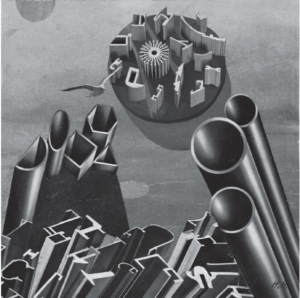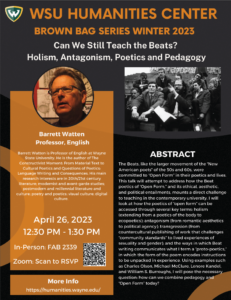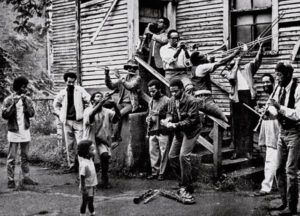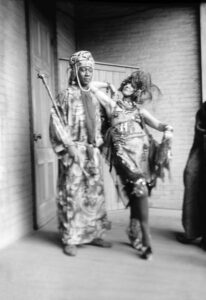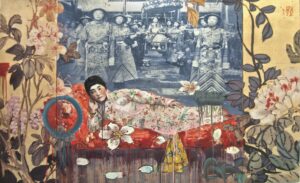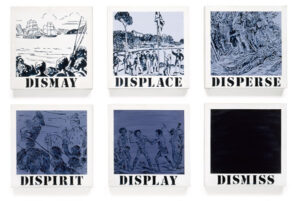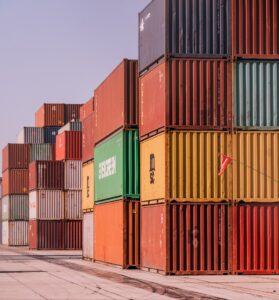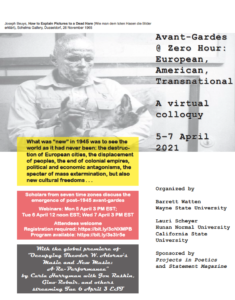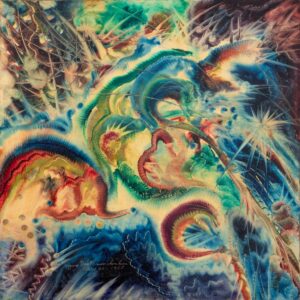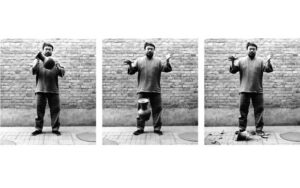
CALL FOR PAPERS
Diasporic Avant-Gardes:
East Asian Transitions in Form and Genre
American Comparative Literature Association
National Taiwan Normal University, Taipei
15–18 June 2022
Barrett Watten, English, Wayne State University
Lauri Scheyer, British and American Poetry
Research Center, Hunan Normal University
This seminar continues the work of Diasporic Avant-Gardes: Experimental Poetics and Cultural Displacement (ed. Barrett Watten and Carrie Noland; Palgrave, 2009)—a collection of essays addressing the intersection of diasporic literatures and the European avant-garde, with examples from African, Maghrebi, Jewish, and Hispanic diasporas. A decade later, much new work has appeared on innovative forms and genres of poetry, prose, visual art, and media reflecting the diasporic experience of East Asians over two centuries of global migration. On the one hand, the emergence of self-described avant-garde movements that engage and depart from the Euro-American model, particularly in Japan and China but at differing moments in the 50s/60s and 80s/present, has been recognized in major exhibitions. Global figures such as Yoko Ono, Yayoi Kusama, Ai Wei-wei, Cai Guo-qiang, and Huang Yongping critically address issues of material form, cultural translation, commodification, economic dispossession, and global migration. The work of experimental East Asian poets such as Kim Hyesoon, Ito Hiromi, and Hsia Yu opens the way toward a developing canon of women authors in translation and has led to critical reflection on translation itself. Asian American poets with differing histories of emigration have developed a range of innovative forms, from authors such as John Yau, Mei-mei Berssenbrugge, Pamela Lu, and Tan Lin to Don Mee Choi, Sawako Nakayusa, Mary-Kim Arnold, and Ocean Vuong. New prose genres have appeared after the examples of Maxine Hong Kingston and Yoko Tawada in innovative fictions by Tao Lin, Eugene Lim, and Karen An-hwei Lee. The reception of Asian American visual artists from Nam June Paik, Theresa Hak Kyung Cha, and Tehching Hsieh to the current exhibition of Hung Liu points toward the global transition of strictly Eurocentric theories of the avant-garde. This seminar seeks papers that explore individual artists and movements; reflects on their innovations of form and genre; and theorizes experiences of cultural distinctiveness in terms of migration, displacement, cultural heritage, appropriation, linguistic and stylistic hybridity, radical iconoclasm, and syncretic identity—seen in a productive dialogue with or a decisive reconceptualization of Euro-American avant-garde movements.
Submit proposals to ACLA by Sunday, October 31 here
For PDF flyer, click here; for online seminar page, here
Contact barrett.watten@gmail.com for more information
N.B. “In view of the ongoing pandemic, the 2022 conference may need to be moved online again. The board has developed a contingency plan and will make a final decision in January 2022″—ACLA.
Notes
Ai Wei-wei, Dropping a Han Dynasty Urn, 1995
